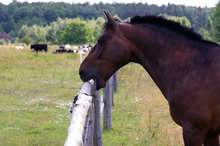Your horse presses his top teeth against a solid object, arches his neck, and swallows air in a rocking motion. A grunting or gulping noise emerges. This is cribbing. Its true cause is unknown but genetics along with stressful circumstances appear to be the underlying problems.

Horse cribbing on fence
While thereâs nothing you can do to change the past, you can take measures to reduce physical discomfort and mental strains that contribute to cribbing.
Cribbing is such a seriously addictive habit that many horses will actually prefer it to eating, and so they will slowly waste away.
Early weaning can lead to this negative behavior later in adult horses. While thereâs nothing you can do to change the past, you can take measures to reduce physical discomfort and mental strains that contribute to cribbing. Cribbing collars are tormenting. They may discourage the behavior but they do not relieve the urge.
Managing your horseâs conditions will help lessen the behavior. Here are some suggestions:
- Provide freedom to graze and roam. This will have a remarkable effect on stopping this habit. If this is not feasible, give him as much outdoor space as possible.
- Keep hay in front of your horse at all times. This one simple change will calm your horseâs demeanor.
- Do not isolate your horse. Non-cribbers will not âcatchâ the cribbing habit by seeing another horse do it.
- Consider ulcers. Most cribbers have ulcers. Stress, forage restriction, and stalling make things worse. Basic nutritional management to cure ulcers includes supplying hay that is always available 24/7, plentiful water consumption, avoiding starchy feeds (such as oats and corn) and sweet feeds, and restoring microbial populations through pro/prebiotic use.
About Dr. Getty:
Juliet M. Getty, Ph.D. is an independent equine nutritionist with a wide U.S. and international following. Her research-based approach optimizes equine health by aligning physiology and instincts with correct feeding and nutrition practices. Dr. Gettyâs goal is to empower the horseperson with the confidence and knowledge to provide the best nutrition for his or her horseâs needs.
Dr. Gettyâs fundamental resource book, Feed Your Horse Like a Horse, is available at www.GettyEquineNutrition.com -- buy it there and have it inscribed by the author, or get it at Amazon (www.Amazon.com) or other online retail bookstores. The seven individual volumes in Dr. Gettyâs topic-centered âSpotlight on Equine Nutritionâ series are available with special package pricing at her website, and also at Amazon in print and Kindle versions. Dr. Gettyâs books make ideal gifts for equestrians.
Find a world of useful information for the horseperson at www.GettyEquineNutrition.com: Sign up for Dr. Gettyâs informative, free e-newsletter, Forage for Thought; browse her library of reference articles; search her nutrition forum; and purchase recordings of her educational teleseminars. Find top-quality supplements, feeders, and other equine-related items, at her online Free Shipping Supplement Store[i]. Reach Dr. Getty directly at gettyequinenutrition@gmail.com. She is available for private consultations and speaking engagements.
